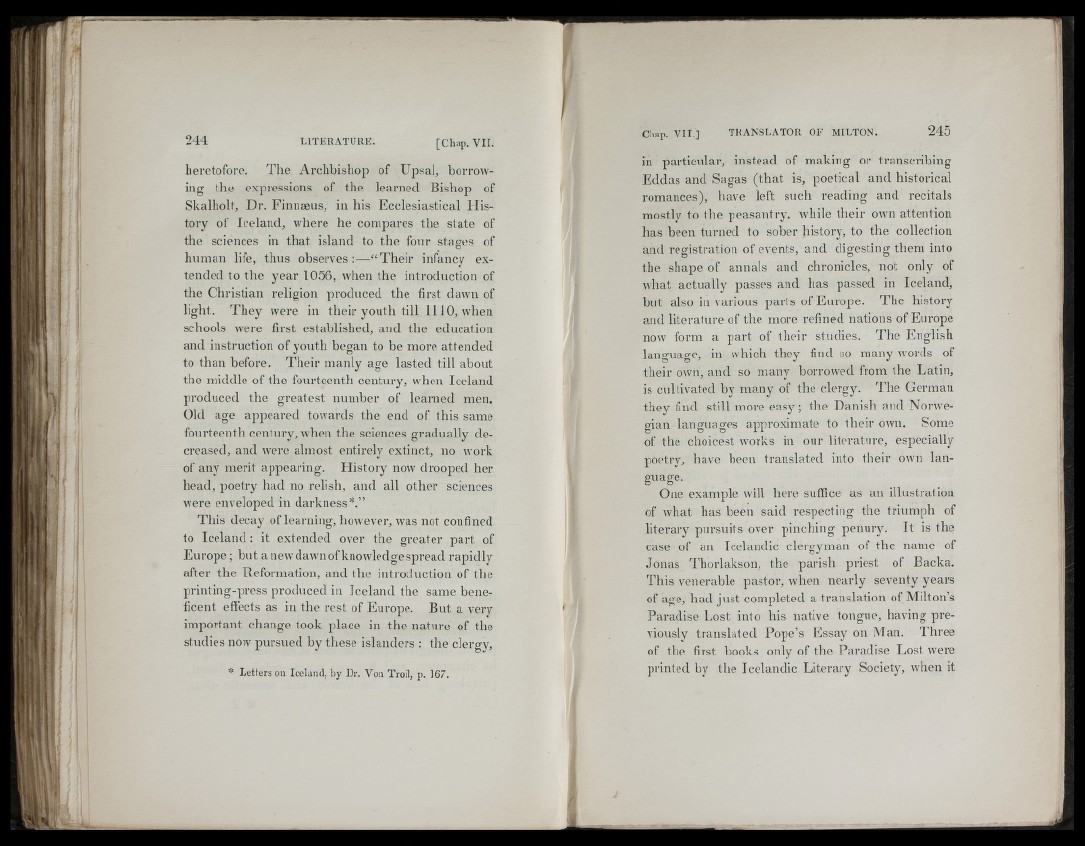
isri!
-j
i' t
lieretofore. The Archbishop of Upsal, borrowing
the expressions of the learned Bishop of
Skalholt, Dr. Finnseus, in his Fcclesiastical History
of Iceland, where he compares the state of
the sciences in that island to the four staofcs of
human life, thus observes:—“ Their infancy extended
to the year 1056, when the introduction of
the Christian religion produced the first dawn of
light. They were in their youth till 1110, when
schools were first established, and the education
and instruction of youth began to be more attended
to than before. Their manly age lasted till about
the middle of the fourteenth century, when Iceland
produced the greatest number of learned men.
Old age appeared towards the end of this same
fourteenth century, when the sciences gradually decreased,
and were almost entirely extinct, no work
of any merit appearing. History now drooped her
head, poetry had no relish, and all other sciences
were enveloped in darkness*.”
This decay of learning, however, was not confined
to Icelan d : it extended over the greater part of
Furope; but a new dawn of knowledge spread rapidly
after the Reformation, and the introduction of the
printing-press produced in Iceland the same beneficent
effects as in the rest of Furope. But a very
important change took place in the nature of the
studies now pursued by these islanders : the clergy,
* Letters oa Iceland, by Dr. Von Troil, p. 167.
in particular, instead of making or transcribing
Fddas and Sagas (th at is, poetical and historical
romances), have left such reading and recitals
mostly to the peasantry, while their oivn attention
has been turned to sober history, to the collection
and registration of events, and digesting them into
the shape of annals and chronicles, not only of
what actually passes and has passed in Iceland,
bnt also in various parts of Furope. The history
and literature of the more refined nations of Furope
now form a part of their studies. The Fnglish
language, in which they find so many ivords of
their own, and so many borrowed from the Latin,
is cultivated by many of the clergy. The German
they find still more easy; the Danish and Nonve-
gian languages approximate to their own. Some
of the choicest works in our literature, especially
poetry, have been translated into their own language.
One example will here suffice as an illustration
of what has been said respecting the triumph of
literary pursuits over pinching penury. It is the
case of an Icelandic clergyman of the name of
Jonas Thorlakson, the parish priest of Backa.
This venerable pastor, when nearly seventy years
of age, had just completed a translation of Milton’s
Paradise Lost into his native tongue, having previously
translated Pope’s Fssay on Man. Three
of the first books only of the Paradise Lost were
printed by tlie Icelandic Literary Society, when it